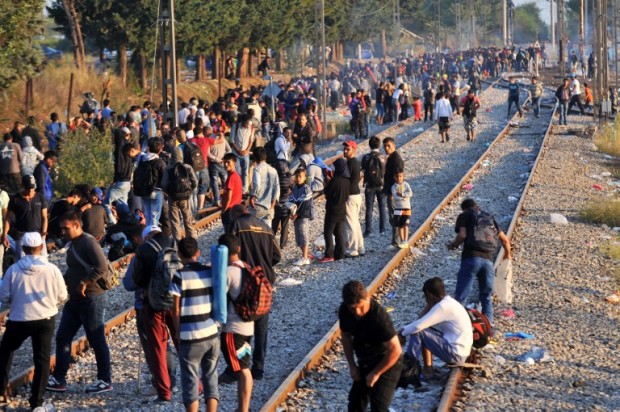Refugees ‘may end up boosting European economies’—analysts

Migrants and refugees wait to cross the Greece-F.Y.R. Macedonia border near the village of Idomeni, in northern Greece on September 13, 2015. Three people, including a child, drowned when a boat carrying some 100 migrants capsized off Greece early on September 13, the Athens News Agency reported. It said the coastguard had rescued 68 people following the incident off the island of Farmakonisi in the Southern Aegean Sea. AFP PHOTO
PARIS, France—European nations overwhelmed by the biggest refugee crisis since World War II may end up boosting their economies if they just let the migrants in, analysts say.
More than 430,000 people have crossed the Mediterranean to Europe so far this year. Nearly 2,750 have died, and more arrive every day, many fleeing war zones in Syria and Afghanistan.
READ: EU fails to reach migrant deal as countries impose border checks
The challenge has left the European Union scrambling for answers, with member nations disagreeing Monday over a proposal to share out 120,000 refugees and ease the burden on frontline states.
But beyond the immediate logistical challenges and predominant humanitarian concerns, the economic impact of the tide of refugees moving to Europe is slight, and may well be positive, analysts say.
Article continues after this advertisementWelcoming refugees offers Europe the chance “not only to honor its position as a democratic Union that is wealthy and respectful of tradition, but also to expand its growth prospects,” Patrick Artus, economist at French investment bank Natixis, said in a recent report.
Article continues after this advertisementHolger Schmieding, economist at the German investment bank Berenberg, estimated that the arrival of refugees could boost economic output in the eurozone by 0.2 percent as of the second half of 2015.
Migrants play an important role in economic expansion and in periods of decline, said historian Nancy Green, researcher at the School for Advanced Studies in the Social Sciences in Paris.
New arrivals often work in sectors where conditions are viewed as unsatisfactory for native-born workers, she said, citing the clothing and steel industries of the 19th and 20th centuries and the services industries of today.
“Our continent could and should become a great land for immigration in the 21st century,” influential French economist Thomas Piketty wrote in a recent column in the French daily Liberation.
The costs to national budgets are minimal, too, according to a report issued last year by the club of advanced economies, the Organisation for Economic Cooperation and Development.
‘Impact close to zero’
“The impact of the cumulative waves of migration that arrived over the past 50 years in OECD countries is on average close to zero,” it said, citing new studies showing that the cost or benefit to the public purse rarely exceeds 0.5 percent of total economic output.
“Welcoming refugees is a humanitarian decision, it can never be an economic decision,” stressed Jean-Christophe Dumont, specialist in migration at the OECD. “It has a cost over several years and it is not major,” he added.
People fleeing war have not prepared their migration nor chosen their destination, Dumont said.
“They have gone through a traumatic situation, they need time to recover. We cannot expect them to start answering job advertisements when they get off the bus,” the analyst said.
Refugees arriving in Europe would need five or six years to match the employment level of migrants who enter to join families already resident in their host nations, and 15 years to match that of the native-born workforce, he said.
Refugees, like other migrants, do not aim to be dependant on welfare, Dumont added. “They want to rebuild, to have a better life for their children, to work,” he said.
Economic studies show that the impact of migration is minor, both on the labour market and public finances, according to El Mouhoub Mouhoud, economics analyst at the Paris Dauphine University.
‘Refugees are an investment’
“It is not the same thing for a country like Lebanon which in the space of a few years admitted the equivalent of one quarter of its population,” Mouhoud said.
The new arrivals are increasingly well qualified because the poorest lack the means to leave, he added.
“When we say we cannot take in the destitute of the world, we are wrong. It is not the destitute who we are taking in despite appearances,” the analyst said.
Marcel Fratzscher, head of the German economic research institute DIW said the refugees should not be seen as a financial burden. “The refugees are an investment, it is not money lost.”
Standard & Poor’s said that the budgetary impact on European nations wouldn’t put their credit ratings at risk, but the influx of potential workers would also not help them cope with ageing societies.
But it said the refugee crisis could expose the EU’s inability to find cooperative solutions and distract it from other challenges.
“If mishandled, Europe’s approach to solving the refugee influx may lead to increased populism and xenophobia, diverting attention from budgetary and structural reforms,” said Standard & Poor’s in a report.
RELATED STORIES
Hungary shuts migrant fence as EU fails to reach deal